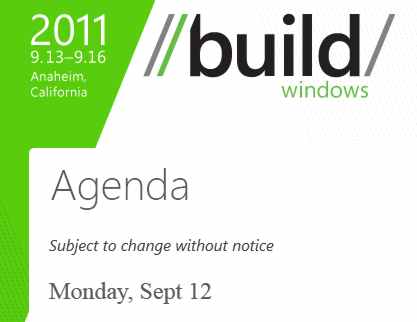| The quiet before the storm - Windows 8 and Build |
| Written by Mike James | |||
| Saturday, 10 September 2011 | |||
|
With only a few days to go before the Microsoft Build conference, now is perhaps the last moment to sit back and consider the extraordinary sequence of events that have led up to where we are. I'm not going into the fine details of what has happened. The rough outline is that Microsoft spooked the developer community by seeming to say that it was backing an HTML5 approach to Windows application development. A harmless enough thing to say, but it was taken as at least an indication that Microsoft was no longer backing Silverlight, WPF and .NET in general. Since then Microsoft has tried to put things right and reassure everyone that Silverlight is safe, but leaks and rumors when added together still suggest otherwise. In particular, the amount of attention C++ has been getting really does backup the idea that WinC++ is going to be the new .NET. The word "native" crops up so often in Microsoft's pronouncements that it seems to be a marketing imperative. To go with the new native approach to Windows application development, we also have rumors of Jupiter, a DirectX derived 2D UI framework that can be used from C++, JavaScript or XAML. It all makes sense if you see it as a struggle for power between the language people working on .NET and the systems people still committed to C++ and the old ways of doing things, i.e. COM and native code. In an effort to convince the community that it is providing information on what it is doing, Microsoft's Building Windows 8 blog has been dribbling information out at a rate that suggests that the purpose is to keep a secret, not spread the word. So far the blog has released the fact that Windows will support USB3; boot faster; have a new file manager in the form of a revamped Windows Explorer; and support ISO and VHD file formats. While these things are interesting, they are fairly obvious or tangential to the core issues. Yes, Window 8 will support USB 3 - it would be a surprise if it didn't - and what version of Windows hasn't promised to boot faster. Announcing that the ISO and VHD file systems are going to be supported simply raises the question of why they aren't already supported. So the only interesting news we have is that the file manger is going to be fixed. Even the news that Windows 8 will have two versions of the desktop - one for tablets and one for, well,desktops - isn't amazing news. Windows has always used a shell application to provide desktop services and so it's about time that we can finally pick what sort of shell we want to run. So no surprises and no public agenda for Build yet even though there is just one working day to go. The most amusing thing is that at the top of the Build Agenda is says "Subject to change without notice" - some change, any change would be welcome.
Has it ever happened that a major conference has kicked off without a published agenda of any sort? So what can we expect from Build? It is supposed to be: a new event that shows modern hardware and software developers how to take advantage of the future of Windows. But despite the mention of hardware application developers are flocking to find out the future of the platform - after all it did replace this year's PDC. The rumors are:
Apart from this we know nothing at all. Not even state security services manage to keep secrets like this. One could almost imagine that perhaps it's all very last minute and perhaps a bit rushed. So what might there be to see? This is an important question because having expectations means we can make a better objective assessment of what actually happens. Yes, I think that there will be Windows 8 Beta, but this doesn't mean it will answer developers' questions. After all what you can tell about development strategies by looking at a copy of Windows 7? The razzmatazz and circus of the beta launch should soak up plenty of time and the demos of the tablet interface should soak up some more. Then throw in some sessions with Silverlight 5, ASP.NET MVC, and some of the less disruptive aspects of the revitalized C++, and you can probably fill most of the time. Add perhaps some vague stuff about what is going to be in Visual Studio and, yes, I really think its possible that Microsoft might be able to give the impression that it has shared some important news without actually parting with anything we really want to know. Microsoft probably won't be honest about the future of Silverlight, WPF, .NET or the alternative future of Jupiter, C++, native apps and HTML5. These things are not tied to the release of the Beta of Windows 8 and this is what the focus of the Build conference is most likely to be. Of course, this could all be wrong and Microsoft might have a clear road map that it outlines at Build and we may all go home knowing where the next few years take us - like it or not.
More InformationWindows 8 - still reading the runes Even less information on Microsoft's Build Microsoft's new developer conference - Build/Windows Dumping .NET - Microsoft's Madness
If you would like to be informed about new articles on I Programmer you can either follow us on Twitter or Facebook or you can subscribe to our weekly newsletter.
|
|||
| Last Updated ( Friday, 13 December 2013 ) |


